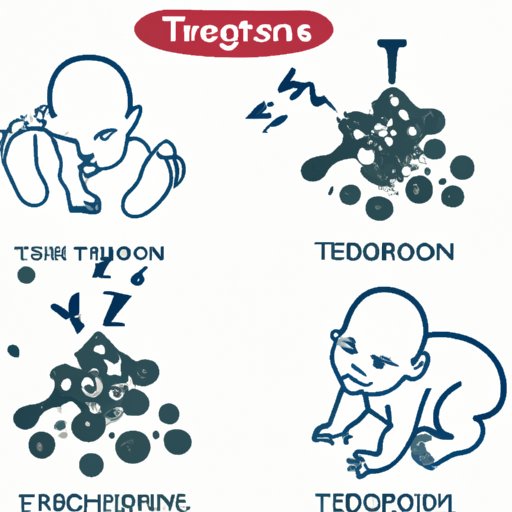Introduction
During pregnancy, expecting mothers are often told to be careful with what they consume or come into contact with, and for good reason. Exposure to certain substances can pose a significant risk to fetal development, potentially causing permanent harm to the growing baby. Understanding what these substances are and how they can affect a developing fetus is crucial for ensuring a healthy pregnancy and birth. In this article, we will explore what teratogens are, their impact on fetal development, and tips for avoiding them during pregnancy.
What Expecting Mothers Need to Know About Teratogens
Teratogens are substances or agents that can cause abnormalities in the development of an embryo or fetus. They are often referred to as “monster makers” because of their ability to cause birth defects, ranging from mild to severe. Teratogens can include environmental toxins, medications, and even certain foods or drinks.
Because the developing fetus is especially vulnerable during early pregnancy, exposure to teratogens during this stage can have particularly harmful effects. The risk of birth defects decreases as the pregnancy progresses, but exposure to teratogens throughout the entire nine months can still pose risks to fetal health.
The Impact of Teratogens on Fetal Development
Teratogens work by interfering or disrupting the normal process of embryonic development. They can affect various stages of fetal growth, from the formation of organs to the development of the brain.
Many teratogens cause harm by crossing the placenta, the protective barrier between the mother and the developing fetus. Once a teratogen enters the fetal bloodstream, it can travel to different parts of the body, potentially causing damage along the way.
Some teratogens may specifically target certain organs or systems, leading to a specific birth defect. For example, exposure to alcohol during pregnancy can cause fetal alcohol syndrome, which can result in physical and cognitive disabilities such as growth deficiencies, hearing and vision problems, and developmental delays.

Understanding Teratogens: How They Affect a Developing Fetus
There are many types of teratogens that can impact fetal development. One common teratogen is alcohol, which is known to cause fetal alcohol syndrome. Environmental toxins such as lead, mercury, and pesticides can also pose risks to fetal health. Certain medications, including some anti-depressants and anti-epilepsy drugs, have been linked to birth defects when taken during pregnancy. Other teratogens may include infectious diseases, radiation, and illicit drugs.
The severity of the effects of teratogens on fetal development can depend on various factors, including the dose and timing of exposure. For example, the first trimester of pregnancy is a critical time for the formation of organs, so exposure to teratogens during this time may lead to more significant birth defects. Certain teratogens may also have a cumulative effect, meaning that repeated exposure over time may increase the risk of harm.
Teratogens and Birth Defects: Dispelling Myths and Providing Information
There are many misconceptions about teratogens and birth defects, leading to confusion and fear among pregnant women. One common myth is that any exposure to a teratogen will automatically cause harm to the developing fetus. However, the reality is that some fetuses may be more susceptible to the harmful effects of certain teratogens than others.
Other factors that may increase the risk of birth defects include genetics, pre-existing health conditions, and nutritional deficiencies. It’s important for pregnant women to work closely with their healthcare provider to identify these potential risk factors and develop a comprehensive plan for ensuring a healthy pregnancy and birth.
The Science Behind Teratogens: Exploring Their Effects on Embryonic Development
Scientists have conducted numerous studies to better understand the effects of teratogens on fetal development. These studies often involve animal models, as it is not ethical to expose pregnant women or human fetuses to potentially harmful substances.
Researchers use a variety of techniques to determine if a substance is teratogenic. These can include examining the effects of the substance on cultured cells, studying the effects of the substance on animals, and analyzing data from human populations exposed to the substance. Despite the numerous studies conducted on teratogens, much is still unknown about their mechanisms of action and the full extent of their potential harm.
Avoiding Teratogens During Pregnancy: Tips for a Healthy Baby
While it may be impossible to completely avoid all teratogens during pregnancy, there are steps that pregnant women can take to minimize their exposure. One of the best ways to reduce the risk of teratogenic exposure is to be mindful of what you eat and drink. Avoiding alcohol, caffeine, and certain types of fish can help ensure a healthy pregnancy. Pregnant women should also avoid exposure to environmental toxins, such as pesticides and lead.
If you are taking medications, it’s important to speak with your doctor about potential risks and benefits. In some cases, alternative medications or treatments may be available that are safer for fetal development.
It’s also important to maintain good overall health during pregnancy. Regular prenatal care, a healthy diet, and appropriate exercise can help ensure a healthy pregnancy and birth.
Conclusion
Teratogens can pose a serious threat to fetal development, potentially causing permanent harm to the growing baby. However, with careful planning and attention, pregnant women can minimize their risk of exposure to these harmful substances and promote a healthy pregnancy and birth. It’s important to stay informed and work closely with your healthcare provider to ensure the best possible outcomes for you and your baby.
